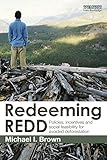Redeeming REDD: policies, incentives and social feasibility for avoided deforestation / Michael I. Brown
Por: Brown, Michael I [autor/a].
Tipo de material: Libro
impreso(a)
Editor: London, England: Earthscan Publications Ltd., 2013Descripción: xii, 330 páginas : ilustraciones ; 23 centímetros.ISBN: 0415517869; 9780415517867.Otro título: Redeeming reducing emissions from deforestation and forest degradation [Otro título].Tema(s): Reducción de Emisiones por Deforestación y Degradación Forestal
Libro
impreso(a)
Editor: London, England: Earthscan Publications Ltd., 2013Descripción: xii, 330 páginas : ilustraciones ; 23 centímetros.ISBN: 0415517869; 9780415517867.Otro título: Redeeming reducing emissions from deforestation and forest degradation [Otro título].Tema(s): Reducción de Emisiones por Deforestación y Degradación Forestal| Tipo de ítem | Biblioteca actual | Colección | Signatura | Estado | Fecha de vencimiento | Código de barras |
|---|---|---|---|---|---|---|
| Libros |
Biblioteca Campeche
Texto en la configuración de la biblioteca Campeche |
Acervo General | 333.75137 B7 | Disponible | ECO040005710 |
Incluye bibliografía: páginas 287-321 e índice: páginas 322-330
List of illustrations.. Acknowledgements.. Abbreviations.. List of acronyms and abbreviations.. Introduction.. 1. Grounds for Pessimism and Optimism.. 2. Theses and Theory of Change.. 3. REDD's Path to Date.. 4. What do Pygmies circa Mobutu's Zaire have to do with REDD?.. 5. Science and Policy.. 6. Stakeholders and REDD.. 7. Social Feasibility and Its Components.. 8. Capacity Building: Often Discussed, Rarely Implemented.. 9. Financing Issues.. 10. Risks Related to REDD.. 11. A New Social Contract for Moving Forward.. Notes.. References.. Index
It is now well accepted that deforestation is a key source of greenhouse gas emissions and of climate change, with forests representing major sinks for carbon. As a result, public and private initiatives for reducing emissions from deforestation and forest degradation (REDD) have been widely endorsed by policy-makers. A key issue is the feasibility of carbon trading or other incentives to encourage land-owners and indigenous people, particularly in developing tropical countries, to conserve forests, rather than to cut them down for agricultural or other development purposes. This book presents a major critique of the aims and policies of REDD as currently structured, particularly in terms of their social feasibility. It is shown how the claims to be able to reduce greenhouse gas emissions as well as enhance people's livelihoods and biodiversity conservation are unrealistic. There is a naive assumption that technical or economic fixes are sufficient for success. However, the social and governance aspects of REDD, and its enhanced version known as REDD+, are shown to be implausible. Instead to enhance REDD's prospects, the author provides a roadmap for developing a new social contract that puts people first. eng
